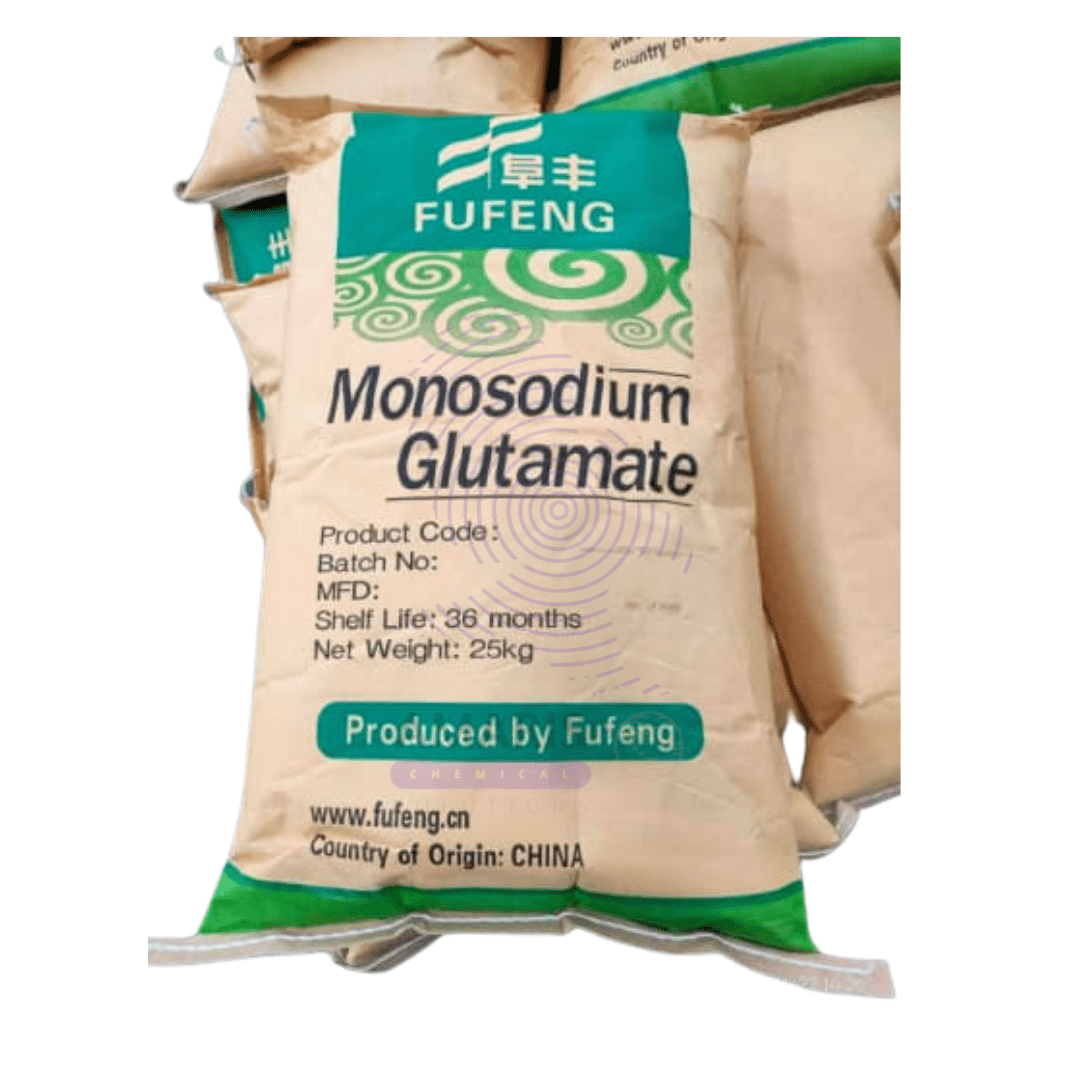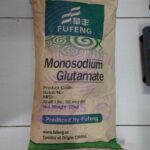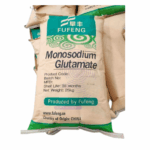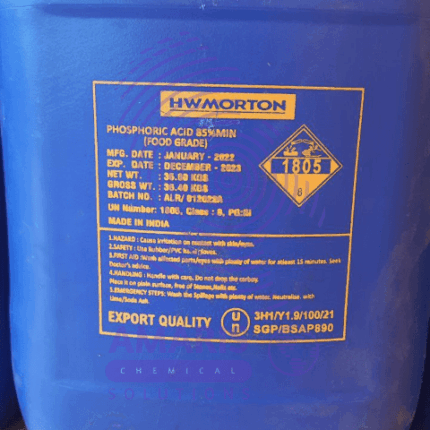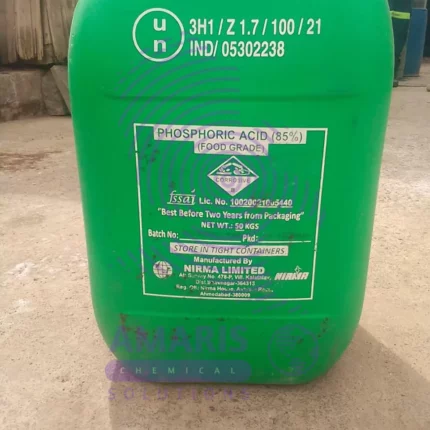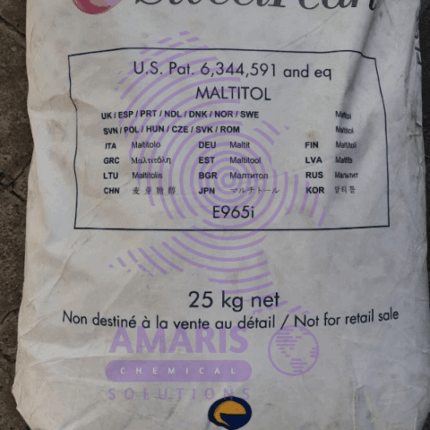
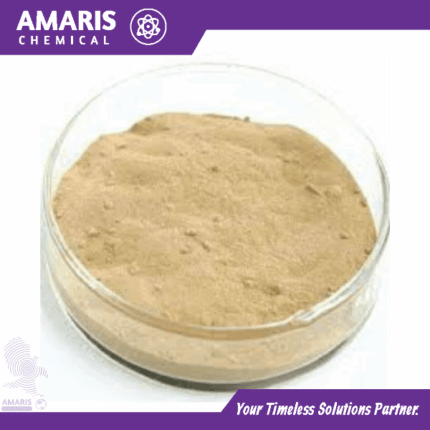
Monosodium Glutamate 25kg
$0.01
Monosodium glutamate (MSG) is a flavor enhancer and food additive that consists of the sodium salt of glutamic acid, an amino acid found naturally in various foods. It is commonly used to enhance the savory or umami taste in a wide range of dishes and processed food products. MSG is a crystalline powder that is white or colorless and is highly soluble in water. When added to food, it enhances the perception of savory taste, making the food more appetizing and flavorful. While some individuals may be sensitive to MSG and experience symptoms such as headaches or flushing, the majority of people can consume it safely in moderate amounts.
Uses of Monosodium glutamate (MSG)
Culinary Applications:
MSG is commonly added to a wide variety of dishes, including soups, sauces, marinades, stir-fries, processed meats, snacks, and instant noodles. It enhances the savory taste of food, known as umami, making it more appealing to consumers.
Processed Foods:
MSG is extensively used in the production of processed and packaged foods, such as canned soups, frozen meals, snack foods, salad dressings, and seasonings. It helps to improve the taste and aroma of these products, enhancing their overall flavor profile.
Restaurant and Fast Food Industry:
Many restaurants, especially those serving Asian cuisine, utilize MSG as a flavor enhancer in their dishes. It is often added to sauces, broths, and seasoning blends to enhance the umami taste and create a more satisfying dining experience.
Meat and Poultry Products:
MSG is commonly employed in the production of processed meats, including sausages, hot dogs, and deli meats. It helps to enhance the meaty flavor and juiciness of these products, improving their overall taste and quality.
Snack Foods:
MSG is frequently used in snack foods like chips, crackers, popcorn, and savory snacks. It contributes to the savory flavor and can increase the palatability of these snacks, making them more enjoyable to consume.
Ready-to-Eat Meals:
Pre-packaged meals and instant food products often contain MSG to enhance their flavor and make them more appetizing. This includes ready-to-eat rice dishes, pasta meals, and microwaveable dinners.


 Emollients
Emollients Humectants
Humectants UV Filters
UV Filters Surfactants (cosmetic)
Surfactants (cosmetic) Preservatives (cosmetic)
Preservatives (cosmetic)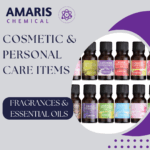 Fragrances and Essential Oils
Fragrances and Essential Oils Antioxidants (cosmetics)
Antioxidants (cosmetics)
 Solvents (lab)
Solvents (lab) Chromatography Chemicals
Chromatography Chemicals Microbiology and Cell Culture Reagents
Microbiology and Cell Culture Reagents Biochemical Reagents
Biochemical Reagents Inorganic and Organic Standards
Inorganic and Organic Standards Spectroscopy Reagents
Spectroscopy Reagents Molecular Biology Reagents
Molecular Biology Reagents
 Precious Metal Extraction Agents
Precious Metal Extraction Agents
 Plasticizers
Plasticizers Polymerization Initiators
Polymerization Initiators Stabilizers
Stabilizers Monomers
Monomers Fillers and Reinforcements
Fillers and Reinforcements Antioxidants (plastics)
Antioxidants (plastics) Colorants (plastic pigments,Dyes)
Colorants (plastic pigments,Dyes)
 Fertilizers
Fertilizers Plant Growth Regulators
Plant Growth Regulators Soil Conditioners
Soil Conditioners Animal Feed Additives
Animal Feed Additives Biostimulants
Biostimulants
 Dough Conditioners
Dough Conditioners Flour Treatments
Flour Treatments Fat Replacers
Fat Replacers Preservatives (baking)
Preservatives (baking)
 Surfactants (cleaning)
Surfactants (cleaning) Builders
Builders Bleaching Agents
Bleaching Agents Enzymes
Enzymes Solvents (cleaning)
Solvents (cleaning) Fragrances
Fragrances Disinfectant
Disinfectant Metal cleaning
Metal cleaning
 Binders/Resins
Binders/Resins Pigments
Pigments Solvents (paint)
Solvents (paint) Additives
Additives Driers
Driers Anti-Corrosion Agents
Anti-Corrosion Agents Specialty Coatings
Specialty Coatings Functional Coatings
Functional Coatings Application-Specific Coatings
Application-Specific Coatings
 Sealants and Adhesives
Sealants and Adhesives
 Biodegradable Surfactants
Biodegradable Surfactants Bio-based Solvents
Bio-based Solvents Renewable Polymers
Renewable Polymers Carbon Capture Chemicals
Carbon Capture Chemicals Wastewater Treatment Chemicals
Wastewater Treatment Chemicals
 Preservatives (food)
Preservatives (food) Flavor Enhancers
Flavor Enhancers Acidulants
Acidulants Sweeteners
Sweeteners Emulsifiers
Emulsifiers Antioxidants (food)
Antioxidants (food) Colorants (food)
Colorants (food) Nutrient Supplements
Nutrient Supplements Nutraceutical Ingredients
Nutraceutical Ingredients
 Fresh Herbs
Fresh Herbs Whole Spices
Whole Spices Ground Spices
Ground Spices Spice Blends
Spice Blends
 Surfactants(oil)
Surfactants(oil)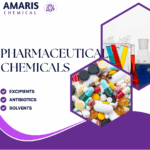
 Antibiotics
Antibiotics Active Pharmaceutical Ingredients
Active Pharmaceutical Ingredients Excipients
Excipients Vaccine Adjuvants
Vaccine Adjuvants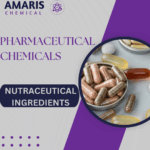 Nutraceutical Ingredients
Nutraceutical Ingredients Solvents (pharmaceutical)
Solvents (pharmaceutical)
 Automotive chemicals
Automotive chemicals Pyrotechnic Chemicals
Pyrotechnic Chemicals


 Vulcanizing Agents
Vulcanizing Agents Accelerators & Retarders
Accelerators & Retarders Antidegradants
Antidegradants Reinforcing Agents
Reinforcing Agents Plasticizers & Softeners
Plasticizers & Softeners Fillers & Extenders
Fillers & Extenders Blowing Agents
Blowing Agents Adhesion Promoters
Adhesion Promoters

